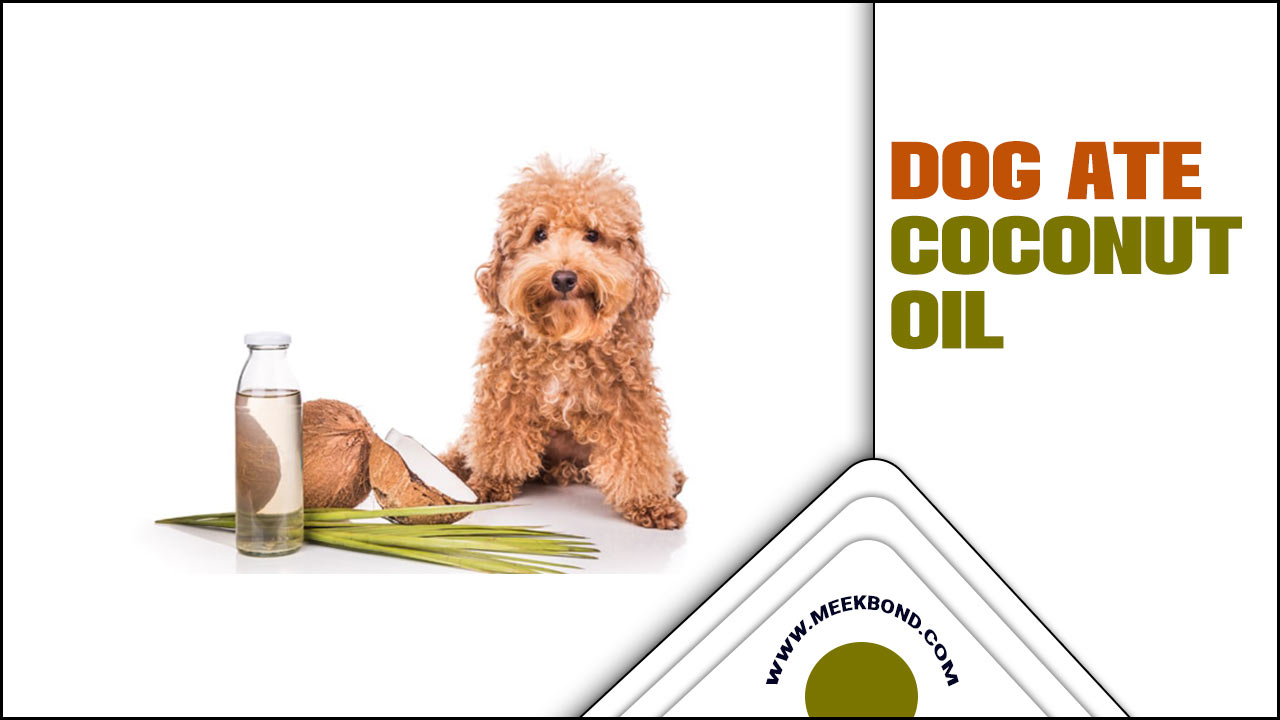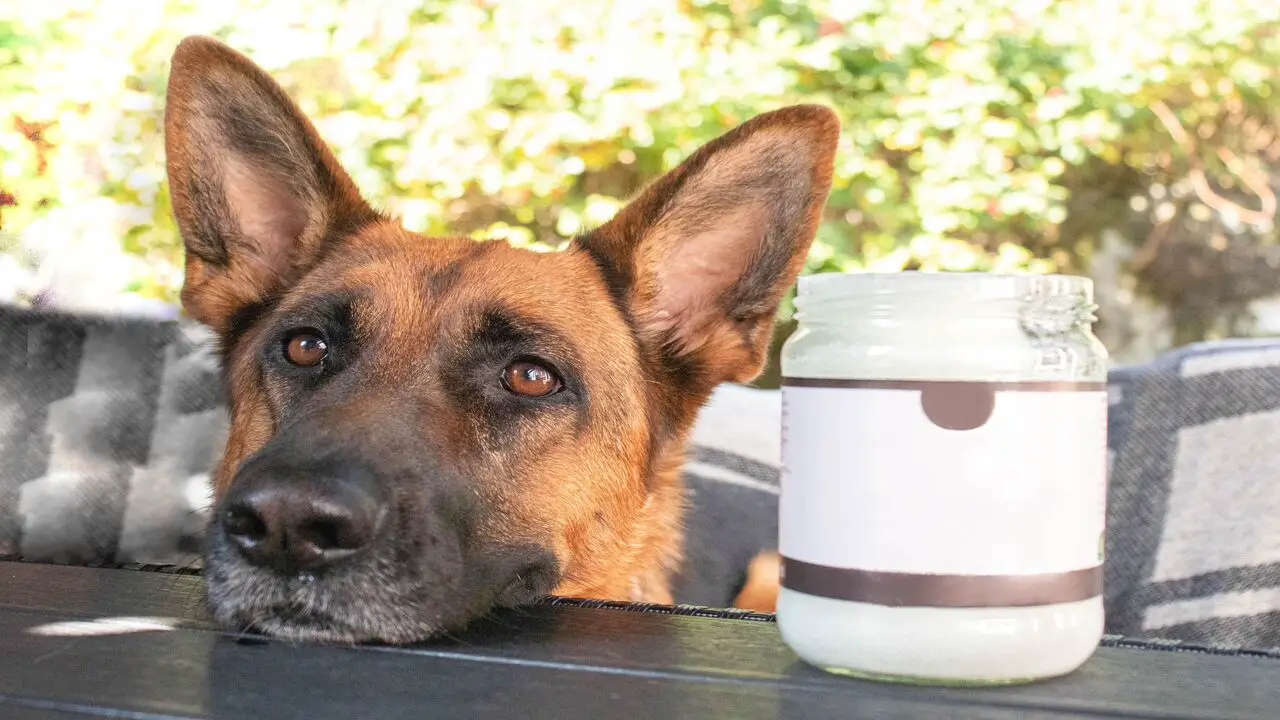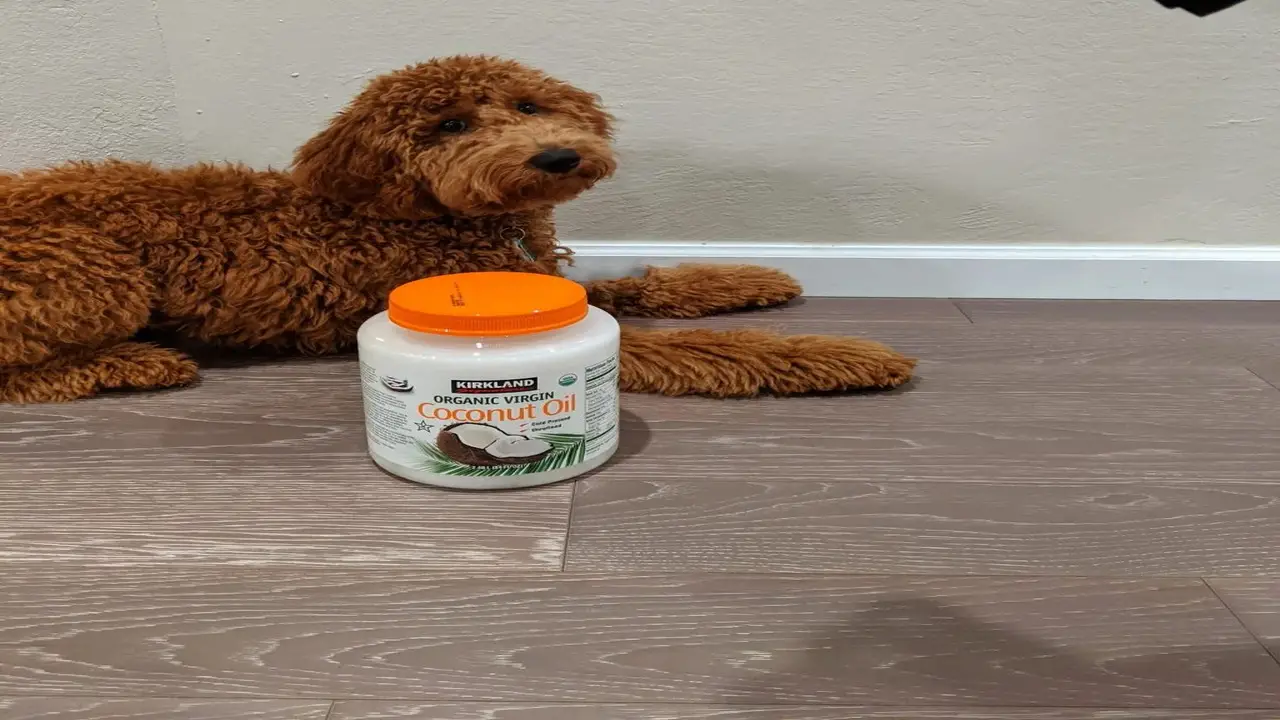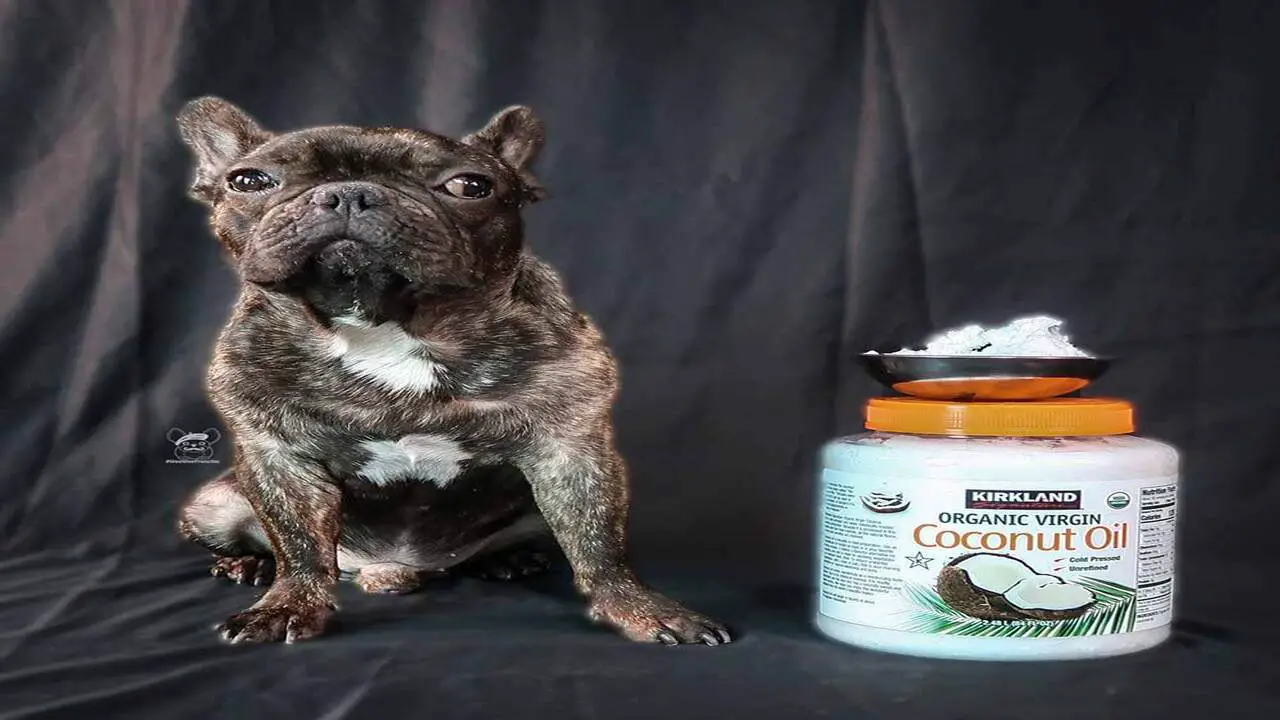Responsible pet owners always want what’s best for their furry friends. From providing them with proper nutrition to ensuring they get enough exercise, we do everything we can to keep them healthy and happy.
But what happens when our dogs get into something they shouldn’t? One common scenario pet owners may encounter is when their dogs eat coconut oil. While coconut oil has become a popular supplement for humans due to its numerous health benefits, it’s important to note that the same may not be true for our pets.
We’ll dive into the topic of dog ate coconut oil. We’ll discuss the potential risks and benefits of feeding coconut oil to our furry friends and what to do if your dog has already ingested this oil. Also, We’ll address common concerns, such as whether or not coconut oil can cause pancreatitis in dogs and what symptoms to watch for if your pup has consumed this oil.

What Is Coconut Oil?
Coconut oil is a natural, edible oil extracted from mature coconut kernels or meat. It has gained popularity recently for its various health benefits and versatile uses. Coconut oil is rich in healthy fats, particularly medium-chain triglycerides (MCTs), known to have numerous health benefits. It can be used for cooking, baking, skincare, and even as a natural remedy for certain ailments.
However, it’s important to note that while coconut oil can benefit humans and dogs, it may not be safe or appropriate for all animals. If your dog has ingested coconut oil or any other substance, it’s best to consult a veterinarian to ensure their safety and well-being.
What Should You Do If Your Dog Ate Coconut Oil?

If your dog ate coconut oil, monitoring their symptoms and observing any changes in their behavior is important. In most cases, a small amount of coconut oil is unlikely to cause any harm to dogs. However, if your dog ingested a large amount or shows signs of distress, it is recommended to contact your veterinarian for guidance.
They may advise you to induce vomiting or provide other necessary medical care. It is always better to err on caution when it comes to your furry friend’s health, so don’t hesitate to seek professional advice if you have any concerns.
Benefits Of Coconut Oil For Dogs
Coconut oil offers numerous benefits for dogs. It can enhance their coat and skin health by reducing itching and dryness. Additionally, the medium-chain triglycerides in coconut oil provide quick energy for active pups. The oil’s antimicrobial properties also help fight bacterial, viral, and fungal infections.
Regarding weight management, coconut oil promotes a feeling of fullness and boosts metabolism, making it a good idea for overweight dogs. Furthermore, it supports a healthy immune system and brain function in canines. Adding a small amount to their food can incorporate coconut oil into a dog’s diet.
However, it’s crucial to note that moderation is key, as too much fat can lead to pancreatitis or other digestive issues. It’s always best to consult with a veterinarian to ensure your pup has a healthy amount of coconut oil.
Side Effects Of Coconut Oil For Dogs

While coconut oil has many benefits for dogs, knowing the potential side effects is important. Giving too much coconut oil to your pup can lead to digestive upset, including diarrhea and vomiting. Some dogs may also have an allergic reaction to coconut oil, resulting in itching or skin irritation.
It’s crucial to be mindful of the amount you give your dog, as coconut oil is high in calories, and excessive consumption can lead to weight gain, especially in overweight dogs. Ingesting large amounts of coconut oil can even cause pancreatitis, a potentially serious condition that affects the pancreas. Therefore, it’s essential to determine the appropriate amount based on your dog’s size and individual needs.
Can Coconut Oil Cause Diarrhea In Dogs?
Coconut oil is often touted as a natural remedy for various dog health issues, including digestive problems. However, it is possible for coconut oil to cause diarrhea in dogs if given excessively. Coconut oil is high in fat and can be difficult for some dogs to digest, especially if they have sensitive stomachs or are not used to consuming fatty foods.
Additionally, giving your dog too much coconut oil can lead to an upset stomach and loose stools. Introducing coconut oil gradually into your dog’s diet and monitoring their response is important. If you notice any signs of digestive upset, such as diarrhea or vomiting, it may be best to discontinue using coconut oil and consult your veterinarian.
How To Prevent Dogs From Eating Coconut Oil

To prevent dogs from eating coconut oil, it’s important to take certain precautions. Firstly, store coconut oil in a secure cabinet or pantry, out of your dog’s reach. Ensure open containers of coconut oil are never left unattended, especially around curious pets. Additionally, when using coconut oil topically on your dog’s skin, be cautious, as they may try to lick it off.
If you suspect that your dog tends to eat coconut oil, it might be a good idea to consider alternative products or methods for reaping the benefits of coconut oil. Training your dog to leave items alone and rewarding them for not showing interest in forbidden substances can also be helpful in preventing them from consuming coconut oil unnecessarily.
How To Give Your Dog Coconut Oil

Giving your dog coconut oil can benefit their health and well-being. However, it’s important to know how to administer it to ensure the best results. Always consult your veterinarian before introducing new supplements or changes to your dog’s diet. They can provide personalized advice based on your dog’s needs and health conditions. Here are some tips on how to give your dog coconut oil:
- Start with small amounts: Introduce coconut oil in small quantities to your dog’s diet. This will allow them to adjust gradually and prevent any potential digestive issues.
- Mix it with their food: One of the easiest ways to give your dog coconut oil is by mixing it with their regular food. Start with a teaspoon or less and gradually increase the amount over time.
- Use it as a treat topper: Another option is to use coconut oil as a delicious treat topper. You can drizzle a small amount over their favorite treats or mix it into homemade dog treats.
- Offer it as a supplement: If your dog isn’t keen on eating coconut oil directly, you can try giving them coconut oil capsules or soft gels specifically made for pets.
Risks Associated With Feeding Coconut Oil To A Dog

Feeding coconut oil to your dog can have potential risks that pet owners should be aware of. While coconut oil is often promoted as a beneficial supplement for dogs, it is important to exercise caution and consult a veterinarian before incorporating it into your pet’s diet.
One risk associated with feeding coconut oil to dogs is the potential for gastrointestinal upset. Coconut oil is high in fat, and consuming large amounts can lead to diarrhea or an upset stomach. Additionally, some dogs may have an allergic reaction to coconut oil, which can cause symptoms such as itching, hives, or difficulty breathing.
It is also worth noting that while coconut oil has been touted for its potential health benefits, there is limited scientific research supporting these claims in relation to dogs. Therefore, it is always best to consult a professional before changing your pet’s diet or introducing new supplements.
Conclusion
Coconut oil can be beneficial for dogs when given in moderation and under the guidance of a veterinarian. It provides various health benefits, such as improved digestion, healthier skin, and coat, and boosted immune system. However, it is important to note that excessive consumption of coconut oil can lead to digestive issues and other complications in dogs.
If your dog accidentally ingests a large amount of coconut oil, it is recommended to monitor their symptoms closely and seek veterinary advice if necessary. Remember to always keep coconut oil out of reach of your pets to prevent any unwanted incidents. We hope now you understand what should you do if your dog ate coconut oil.
Frequently Asked Questions
How Much Coconut Oil Can A Dog Eat?
The amount of coconut oil a dog can consume depends on size and weight. As a general guideline, dogs can have approximately 1 teaspoon of coconut oil per 10 pounds of body weight. However, it’s crucial to consult with a veterinarian before adding coconut oil to your dog’s diet to ensure the proper dosage and avoid potential digestive issues.
Can Coconut Oil Cause Pancreatitis In Dogs?
Consuming large amounts of coconut oil can lead to pancreatitis in dogs, causing symptoms like vomiting, diarrhea, and abdominal pain. It’s important to consult a veterinarian if your dog shows signs of illness after consuming coconut oil.
Can Dogs Lick Off Coconut Oil?
Dogs can definitely lick off coconut oil. It is safe for them to consume in small amounts. However, excessive consumption can lead to digestive issues like diarrhea. Before adding coconut oil to your dog’s diet, it’s best to consult with a veterinarian.
Why Does My Dog Throw Up When He Eats Coconut?
Some dogs may experience vomiting after eating coconut due to allergies or digestive issues. Coconut oil is high in fat and can cause digestive problems if consumed excessively. If your dog vomits after eating coconut, it’s best to consult with a veterinarian for further guidance.
Is Coconut Oil Safe For Dogs To Consume?
Coconut oil is generally safe for dogs in small amounts. It can offer health benefits like improved digestion and a shiny coat. However, excessive consumption may cause diarrhea and weight gain. Always consult your vet before introducing your dog to any new food or supplement.

Aquarium passion is all about connecting with the aquatic life and providing education to the public on the importance of these creatures. We showcase a wide variety of marine life through our exhibits as well as working with schools to provide unique learning opportunities for students of all ages.








